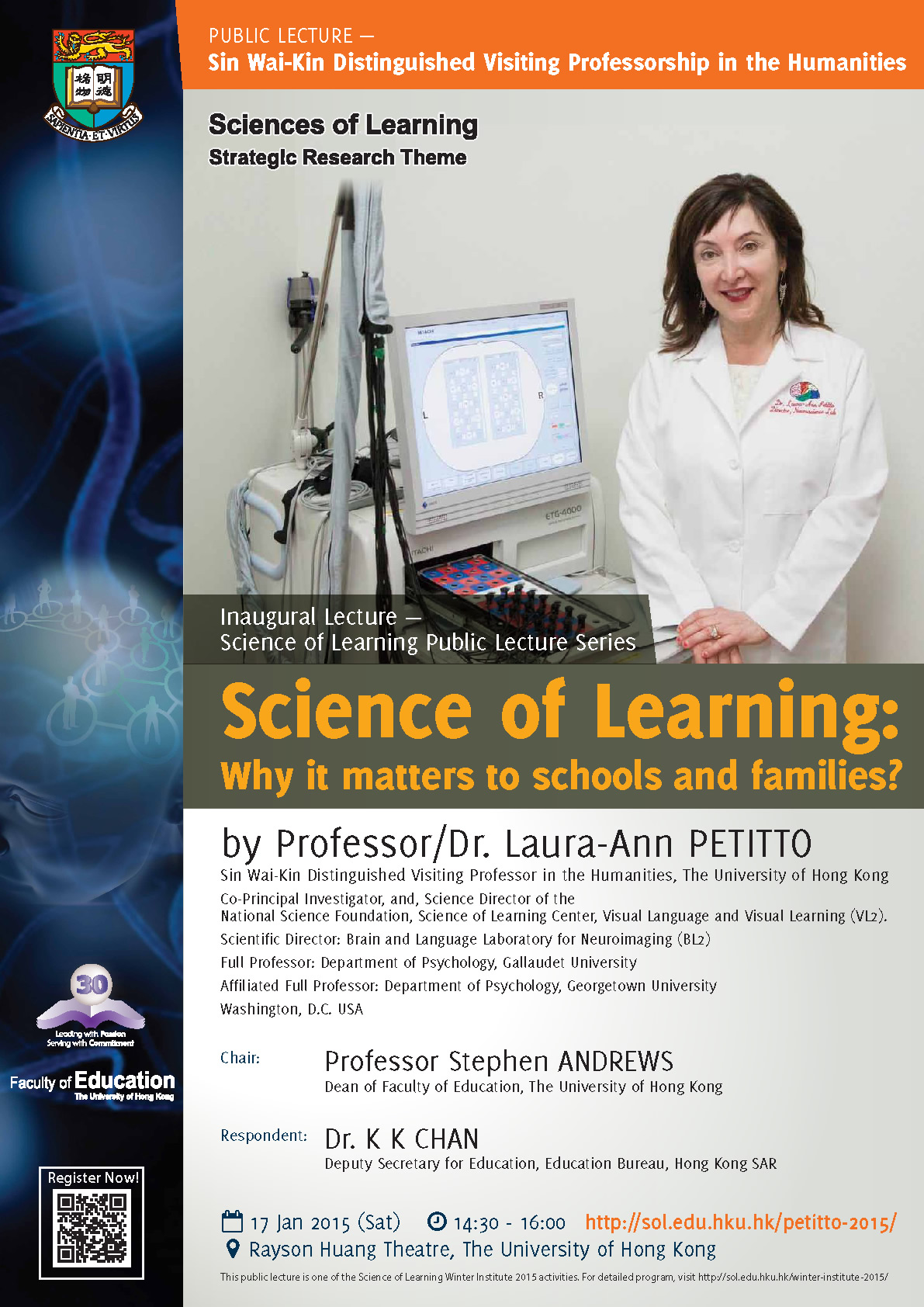Tag Archives: optimal learning across life
Science of Learning — Why it matters to schools and families?
[speaker]Prof. Laura-Ann PETITTO, [affiliation]
Sin Wai-Kin Distinguished Visiting Professor in the Humanities, The University of Hong Kong;
Full Professor, Department of Psychology, Gallaudet University, Washington, D.C. USA[/affiliation][/speaker]
[chair]Professor Stephen Andrews, Dean of Faculty of Education, The University of Hong Kong[/chair]
[respondent]Dr. K K Chan, Deputy Secretary for Education, Education Bureau, HKSAR[/respondent]
This public lecture is supported by Sin Wai-Kin Distinguished Visiting Professorship in the Humanities and the Inaugural Lecture of Science of Learning Public Lecture Series. It is also one of Winter Institute 2015 activities.
[date]17 January 2015, Saturday[/date]
[time]2:30 pm – 4:00 pm[/time]
[venue]Rayson Huang Theater, HKU[/venue]
Prof. Petitto’s Lecture (3 min highlight)
Prof. Petitto’s Lecture (Full version)
(Skip to) Dr. K K Chan’s Response
(Skip to) Discussion as well as Q&A Session
Abstract
What is the Science of Learning? The 21st Century presents challenges for our children and society like none ever in the history of our species. It is now “normal” for children to interact with, and learn from, machines on a daily basis (e.g., tablets, mobile phones, moocs) spanning home and classroom. Our children will grow up to learn new knowledge that is presently yet to be discovered. While we cannot prepare for every type of new knowledge that is to come, we can best prepare by understanding how we learn. The Science of Learning is an interdisciplinary field that involves the integration of research and knowledge across multiple disciplines to form a powerful new lens on learning. Science of Learning studies yield new discoveries about how we learn most optimally, how different types of knowledge domains draw on different types of learning mechanisms, as learning is not “one size fits all” (learning math is different from learning to read, etc.). Learning both changes the human brain and differs across the lifespan. A critical question is how can we use these research discoveries to design and promote optimal learning across life, as well as educational practice and policy for our children so that they may have the social and cognitive agility to face and survive an ever-evolving technological future? We will explore the roots of this exciting interdisciplinary science and the broad range of questions that researchers ask and answer. Why are combined brain and behavior studies revolutionizing our understanding of learning? (What does the brain tell us anyway?) I will provide an illustrative example of how Science of Learning researchers have provided stunning new insights into the developing brain of the bilingual child. This work bursts old myths about bilingualism, dispels old fears regarding learning, informs us of developmental imperatives for enabling children to achieve the most powerful bilingual learning—and which provides a new view on the very nature of human learning. Policy makers in the Education Bureau, school organizations, principals, teachers, parents and all interested in the future of society are invited to come!
About the speaker
Professor/Dr. Laura-Ann Petitto
Co-Principal Investigator, and, Science Director of the
National Science Foundation, Science of Learning Center,
Visual Language and Visual Learning (VL2).Scientific Director: Brain and Language Laboratory for Neuroimaging (BL2)
Full Professor: Department of Psychology, Gallaudet University
Affiliated Full Professor: Department of Psychology, Georgetown University
Washington, D.C. USA
Web page: http://www.gallaudet.edu/petitto.html
Professor Laura-Ann Petitto, a Cognitive Neuroscientist, is the Co-Principal Investigator, and Science Director, of the USA’s National Science Foundation’s Science of Learning Center, “Visual Language and Visual Learning, VL2” at Gallaudet University. She is also a Full Professor in the Department of Psychology at Gallaudet, an affiliated Full Professor in the Department of Psychology at Georgetown University, and the Scientific Director of her own Brain and Language Laboratory for Neuroimaging. Petitto is known for her role in the creation of the new discipline Educational Neuroscience, and she is one of the Co-Founders as well as Chair of the Steering Committee of the PhD in Educational Neuroscience program at Gallaudet University—the first program of its kind to be created in the United States. Petitto is renowned for her scientific discoveries concerning language and its neural representation in the human brain, how young children acquire language, the shared signed and spoken language processing sites and systems in the human brain, the Bilingual Brain (including sign and spoken bilinguals), and the Reading Brain (including how young signing children use a Visual Sign Phonology en route to deriving meaning from print). Petitto received her Masters Degree in 1981 and Doctoral Degree in 1984 from Harvard University’s Graduate School of Education, Department of Human Development and Psychology (“Psycholinguistics, Language and Cognition Track”). Petitto has won continuous Federal and/or Foundation funding for the past 30 years. She is the recipient of over 35 international prizes and awards for her scientific achievements and discoveries, including the 1998 Guggenheim Award for her “unusually distinguished achievements in the past and exceptional promise for future accomplishment in the Neurosciences.” In 2009, Petitto was appointed a Fellow of the American Association for the Advancement of Science, and a Fellow of the Association for Psychological Science (APS). See http://www.gallaudet.edu/petitto.html
Intended audience
The intended audience of this talk is the public, particularly the officials and policy makers in the Education Bureau, school organizations, principals, teachers, parents and those in the community who are interested in education developments in HK. Science of Learning as a field is not familiar to the community. This talk will provide the broader practitioner community & policy makers with some understanding of what this field of research is about and why does it matter to them. This lecture is intended as the inaugural lecture for a public lecture series on Science of Learning.
[post slug="winter-institute-2015" subtitle="Related event"]



